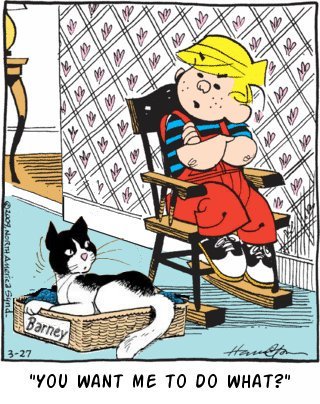Does Your Writing Support Your Company’s Strategy?

One of the staples of comic strip humor is the little kid, such as Dennis the Menace, who asks a guest or a preacher a breathtakingly rude question based on how he’s interpreted something one of his parents has said. While it makes for a laugh in the comic strips, it’s probably not a good strategy at work. Even the newest employee needs to know the basics of talking about your strategic goals.
Inadvertently undermining your company’s strategy?
Every day, you and your fellow leaders work to project your company’s strategy. You carefully construct your marketing messages to reflect and support that strategy. Along with that stream of well-crafted words, though, a gushing river of information is leaving the company all the time. It’s what employees are writing, internally and externally.
Does your team’s daily writing match the carefully crafted messaging? What if Dennis the Menace is inadvertently alive and well in your company?
We can make the mistake ourselves by claiming to be transparent and inclusive, then writing to clients or customers in opaque, distancing language. Our readers will quickly decide that what we do day to day, not what we say we do, is who we really are.
So do you need to hire a gatekeeper to watch the outflow?
How to match up your marketing and your daily communications
You can get it right without having to censor all outgoing email and client letters.
-
Channel that river. Hosting a workshop on reader-centered writing is much more productive and proactive than hiring a censor. Most people’s business writing is writer-centered; employees are steeped in company culture and think more about their own strategy than their customers’. However, readers are more interested in the impact of your vision on themselves, not on your department or bottom line.
-
Encourage all associates, especially leaders, to abandon the outdated idea that business writing needs to sound “formal” or “educated.” Keep that debris out of the stream! Probably you don’t ask your advertising writers to use those criteria as guidelines. Substitute “relatable” and “clear.”
-
Model clear, relatable, reader-centered writing every time you write, and hold your team to that standard. A leader who writes well takes a huge step toward making the censor unnecessary.
You don’t have to fear or fight the river
Business communication that drives your strategy requires more than checking each new hire for the ability to cobble together a sentence. Everyone in the company needs to write in a way that reinforces the company’s vision and brand. Censors tend to be cranky and difficult. The better choice is having everyone learn reader-centered writing.
You have enormous positive influence over what goes into that river of words. Teach the team to write congruently with the brand messages. Then you can ride the river rather than fearing or fighting it.
